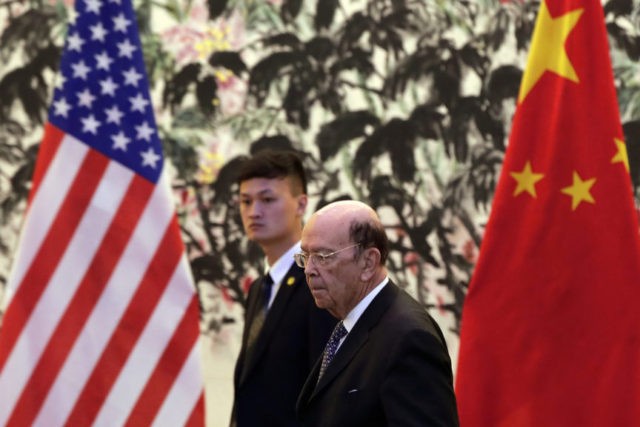The Chinese government ended the latest round of trade talks with a promise that it would not carry out promises to buy more American farm and energy products if the U.S. moves ahead with plans to impose tariffs.
U.S. Commerce Secretary Wilbur Ross led the U.S. team in negotiations this weekend with Chinese officials after several days of talks by lower-level officials. The talks were focussed on getting China to move ahead with its recent promises to increase energy and farm imports from the U.S.
Those promises were made during a recent visit to Washington, DC, by Chinese Vice Premier Liu He. Although the Chinese refused to agree to specific numerical targets that the Trump administration officials sought, the agreement to a broad framework to increase U.S. exports to China was enough to prompt Treasury Secretary Steven Mnuchin to announce that a truce in the “trade war.”
Wilbur Ross’s trip was supposed to be an opportunity to hammer out the details of that pledge.
Last week, however, the U.S. announced that it intended to apply tariffs on $50 billion of Chinese technology goods and impose restrictions on Chinese investments in the U.S. shortly after June 15 unless trade talks reached a major breakthrough.
That has been greeted by China as a break in the truce. At the meetings last week between lower-level Chinese and U.S. officials, negotiations nearly stalled as the two sides failed to reach an agreement on details for increasing Chinese purchases of U.S. crude oil, soybeans, natural gas, beef, and poultry.
China was also ruffled by the imposition of tariffs on steel and aluminum. Although China does not export much steel or aluminum directly to the U.S. due to trade sanctions already in place, it views the U.S. metals tariffs as a roundabout attack on its market power. China is by far the world’s largest steel producer, accounting for nearly 50 percent of all steel production in 2017. The U.S. says China’s outsized production artificially depresses global metals prices, endangering U.S. national security by undermining its domestic steel industry.
Tensions were high enough following the U.S. announcements that the administration considered canceling Secretary Ross’s trip, according to a person briefed on the matter. Ultimately, however, the administration decided to move ahead with the talks to keep the dialog running.
Secretary Ross’s team left Beijing without settling those issues and without any joint statement by negotiators. Instead, China issued its own statement that both praised the negotiations for making “concrete progress” while threatening to abandon the earlier promises of increasing imports from the U.S. in retaliation for tariffs.
“All economic and trade outcomes of the talks will not take effect if the US side imposes any trade sanctions including raising tariffs,” a statement from China’s official Xinhua News Agency said.
China is maneuvering to take advantage of rebukes from U.S. allies following the Trump administration’s decision to slap tariffs on steel and aluminum imported from Canada, Mexico, and European Union. China is attempted to portray itself as defending free trade and global trading rules, although that stance is belied by China’s high tariffs, subsidized exports, state-control of business, and onerous restrictions on foreign companies looking to access the Chinese market.
In the U.S., China hawks have been wary of the deal that Secretary Ross pursued in Beijing. Critics say that the deal risks making the U.S. a supplier of raw materials to fuel China’s expansion and plans to dominate high-tech manufacturing.
Conservative radio host John Fredericks recently wrote in a Breitbart op-ed that the deal was bad because “we would sell China farm goods and energy, the food and raw materials it needs for its industrial economy. They would sell us value added manufactured goods. This is the arrangement Great Britain had with its colonies. Now China would be Great Britain and The United States its colony.”

COMMENTS
Please let us know if you're having issues with commenting.